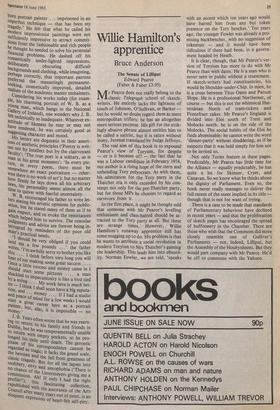Willie Hamilton's apprentice
Bruce Anderson
The Senate of Lilliput Edward Pearce (Faber & Faber £3.95)
Mr Pearce does not really belong to the classic Telegraph school of sketch- writers. He entirely lacks the lightness of touch of Johnson, O'Sullivan, or Barker but he would no doubt regard them as mere metropolitan triflers: he has an altogether more serious purpose. His gift for the strik- ingly abusive phrase almost entitles him to be called a satirist, but it is satire without irony, Juvenal translated by Judge Jeffreys.
The real aim of this book is to expound Pearce's view of Toryism, for despite — or is it because of? — the fact that he was a Labour candidate in February 1974, our author is a rising hope of the stern and unbending Tory polyocrats. As with them, his admiration for the Tory party in the Thatcher era is only exceeded by his con- tempt not only for the pre-Thatcher party, but for those MPs he chooses to regard as survivors from it.
In the first place, it might be thought odd that someone with Mr Pearce's levelling enthusiasm and class-hatred should be at- tracted to the Tory party at all. But these are strange times. However, Willie Hamilton's runaway apprentice still has some mugging up to do. His problem is that he wants to attribute a social revolution in modern Toryism to Mrs Thatcher's gaining the leadership. This leads him into absurd- ity. Norman Fowler, we are told, 'speaks
with an accent which ten years ago would have barred him from any but token presence on the Tory benches.' Ten years ago, the younger Fowler was already a pro- mising backbencher, with no suggestion of tokenism — and it would have been ridiculous if there had been, in a govern- ment headed by Heath.
It is clear, though, that Mr Pearce's ver- sion of Toryism has more to do with Mr Pearce than with dates. He is a man who is never seen in public without a resentment.
If sketch-writers had constituencies, his would be Shoulder-under-Chip. In mien, he is a cross between Titus Oates and Parson Slope. He is a professional Northerner, of course — but this is not the whimsical Hat- tersleian North of tram-tickets and Pontefract cakes. Mr Pearce's England is divided into Eloi south of Trent and Molocks north: he is on the side of the Molocks. The social habits of the Eloi he finds abominable: he cannot write the word `dinner-party' without shuddering, as if he suspects that it was held simply for him not to be invited to.
Not only Tories feature in these pages. Predictably, Mr Pearce has little time for the Alliance — equally predictably, he has quite a lot for Skinner, Cryer, and Canavan. So we know what he thinks about the dignity of Parliament. Even so, the book never really manages to deliver the full extent of the sneer implied in its title though that is not for want of trying.
There is a case to be made that standards of Parliamentary behaviour have declined in recent years — and that the proliferation of sketch pages has encouraged the spread of buffoonery in the Chamber. There are those who wish that the Commons did more closely resemble one of Gulliver's Parliaments — not, indeed, Lilliput, but the Assembly of the Houhynhnms. But they would part company with Mr Pearce. He'd be off to commune with the Yahoos.






































 Previous page
Previous page